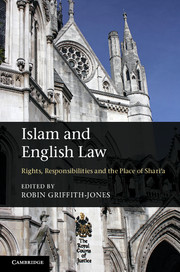Book contents
- Frontmatter
- Contents
- List of contributors
- List of abbreviations
- Preface
- Introduction
- Part I The Archbishop of Canterbury and shariʽa law
- Part II The Archbishop’s proposal for ‘transformative accommodation’
- Part III Responsibilities and rights
- Freedom of speech, incitement to religious hatred: beyond the divide?
- Religion, the state and the meaning of ‘jihad’
- 16 Towards an Islamic society, not an Islamic state
- 17 Following shariʽa in the West
- 18 Violence, personal commitment and democracy
- Part IV Prospect: equality before God and before the law
- Select bibliography
- Index of cases
- Index
- References
16 - Towards an Islamic society, not an Islamic state
Published online by Cambridge University Press: 05 April 2013
- Frontmatter
- Contents
- List of contributors
- List of abbreviations
- Preface
- Introduction
- Part I The Archbishop of Canterbury and shariʽa law
- Part II The Archbishop’s proposal for ‘transformative accommodation’
- Part III Responsibilities and rights
- Freedom of speech, incitement to religious hatred: beyond the divide?
- Religion, the state and the meaning of ‘jihad’
- 16 Towards an Islamic society, not an Islamic state
- 17 Following shariʽa in the West
- 18 Violence, personal commitment and democracy
- Part IV Prospect: equality before God and before the law
- Select bibliography
- Index of cases
- Index
- References
Summary
I will approach the meaning and relevance of jihad in the modern context by trying to clarify the relationship between religion (Islam in this case) and the state. At the end, I will offer some direct responses to questions about jihad and related matters. Since what I am about to say may be surprising, in one way or another, I ask readers to bear with me and try to keep an open mind. In any discourse, preconceptions can by a curious process become so dominant that they start to be taken almost as facts of nature, though actually they are only parts of a human endeavour to understand. There are such preconceptions on all sides in the current debates about religion and the state. Discourses on any subject, including religion, are generated and shaped by the context, conditions and history out of which they emerge; and there is nothing eternal or divine about anything human.
It may also be pertinent to note that I am writing throughout from an Islamic perspective. Whatever I write of my obligation and my conviction, I believe to be my obligation as a Muslim, born of my conviction as a Muslim.
- Type
- Chapter
- Information
- Islam and English LawRights, Responsibilities and the Place of Shari'a, pp. 238 - 244Publisher: Cambridge University PressPrint publication year: 2013
References
- 15
- Cited by

